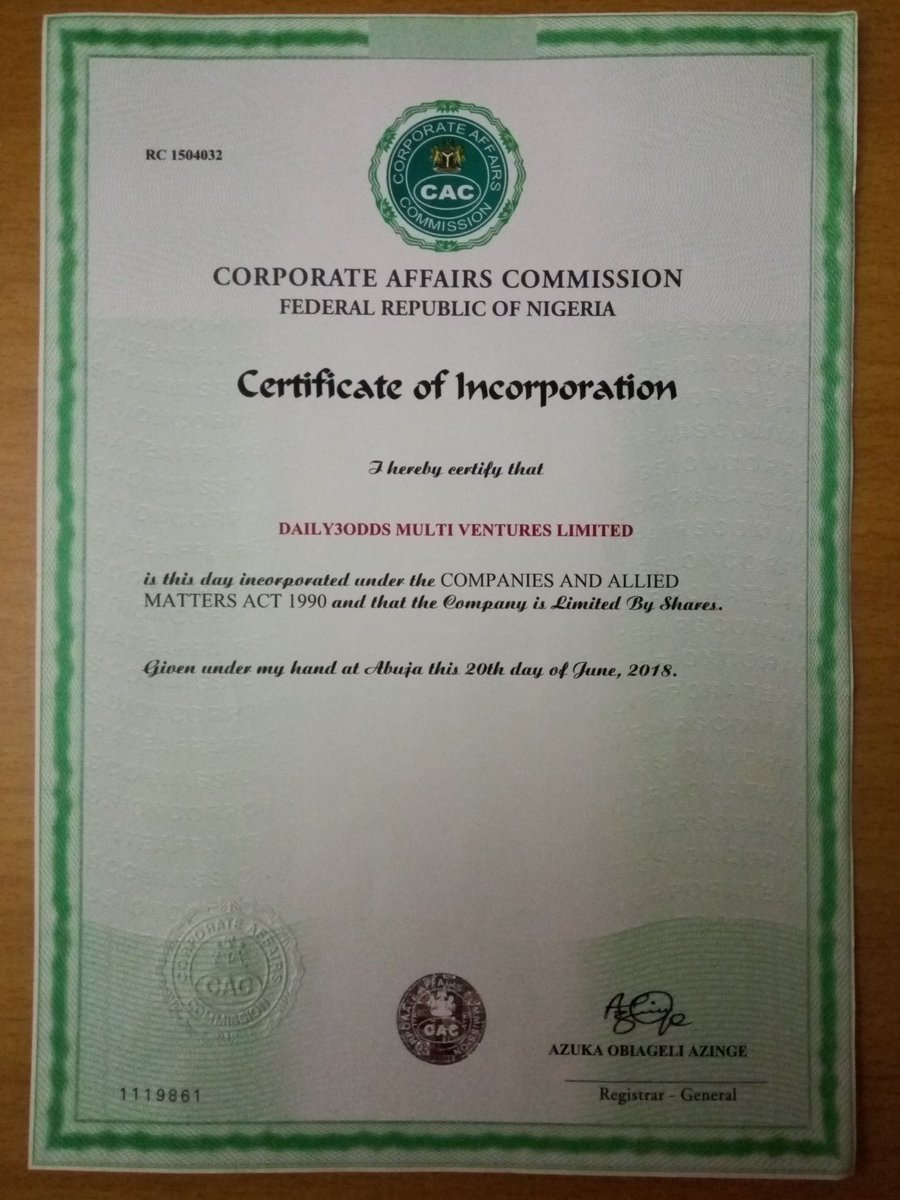

Simple Steps to Successfully Register a Company in Nigeria – 2024 Guide
Introduction
Starting a business is an exciting yet challenging venture, and one of the key steps is to register a company in Nigeria. Whether you are a local entrepreneur or a foreign investor, understanding the process of company registration is essential for operating legally within the Nigerian business ecosystem. In 2024, the process has evolved to become more streamlined with the introduction of new technologies and regulations, ensuring a smoother experience for entrepreneurs.
A company can be referred to as a corporate entity, which upon incorporation becomes a separate legal entity with the perpetual succession and the capacity to sue and be sued. The law governing how to register a company in Nigeria is the Companies and Allied Matters Act (CAMA) LFN 2004.
A company may be incorporated as a company limited by shares or unlimited company. Any of these types of companies may either be a private or public company.
The Corporate Affairs Commission (CAC) was established by the Companies and Allied Matters Act, which was promulgated in the year 1990 to regulate the formation and management of companies in Nigeria. The CAC is saddled with the responsibility of registering companies in Nigeria.
This guide walks you through the steps to successfully register a company in Nigeria, highlighting key updates, common mistakes, and the importance of compliance with Nigerian business laws.
Overview of Company Registration in Nigeria (2024)
Registering a company in Nigeria is a formal process governed by the Corporate Affairs Commission (CAC), Nigeria’s regulatory body for business incorporation. It provides legal recognition to your business, ensuring that it operates within the framework of Nigerian laws. In 2024, the process has been made more efficient with the adoption of digital platforms by the CAC.
There are several types of companies you can register in Nigeria, including:
-
Private Limited Liability Company (Ltd)
-
Public Limited Liability Company (PLC)
-
Unlimited Liability Company
-
Foreign Companies
The Private Limited Liability Company is the most common type, offering limited liability to its shareholders and allowing it to operate as a separate legal entity.
Why Register a Company in Nigeria?
There are several benefits to registering a company in Nigeria:
-
Legal Protection: It protects the business owners’ personal assets, as the company becomes a separate legal entity.
-
Access to Funding: Registered companies are more likely to secure funding from banks, investors, and government programs.
-
Business Credibility: Registering your company builds trust with customers, partners, and investors.
-
Tax Compliance: A registered company ensures that you comply with Nigerian tax laws, such as VAT, Company Income Tax, etc.
-
Business Expansion: Company registration opens doors for easier expansion, franchising, and partnership opportunities.
Eligibility Criteria for Company Registration in Nigeria
To register a company in Nigeria, you must meet the following requirements:
-
Minimum of Two Shareholders: The company must have at least two shareholders, who can be individuals or corporate entities.
-
At Least One Director: The director must be a legal adult (18 years and above) and capable of managing the company.
-
Registered Office Address: The company must have a physical address in Nigeria.
-
Share Capital: For a private limited company, the minimum share capital is typically N10,000, but this can vary depending on the nature of the business.
-
National and International Eligibility: Both Nigerian and foreign nationals are eligible to register a company in Nigeria, though foreign investors may need to meet additional requirements.
Step-by-Step Guide to Registering a Company in Nigeria (2024)
Step 1: Choose Your Company Name
Choosing the right name for your company is the first step in the registration process. The name must be unique and not infringe on existing trademarks or business names. You can check for name availability on the Corporate Affairs Commission (CAC) portal.
Once you’ve found an available name, you will need to reserve it with the CAC before moving forward with registration.
Step 2: Prepare Required Documents
For company registration, you will need the following documents:
-
Memorandum of Association (MOA): This outlines the company’s objectives and activities.
-
Articles of Association (AOA): This document governs the company’s internal management.
-
Proof of Identity: Photocopies of government-issued ID (passport, driver’s license) of directors and shareholders.
-
Corporate Address: A valid Nigerian address for the company’s headquarters.
-
Passport-sized Photographs: For directors and shareholders.
Step 3: Register with the Corporate Affairs Commission (CAC)
Once you have your documents ready, the next step is to submit them online to the CAC through their online portal. The registration process includes filling out the necessary forms, submitting your documents, and paying the required registration fee.
It typically takes about 48 hours to process the registration, but this can vary depending on the complexity of the company structure.
Step 4: Obtain a Tax Identification Number (TIN)
After successfully registering your company, you must obtain a Tax Identification Number (TIN) from the Federal Inland Revenue Service (FIRS). This number is required for filing tax returns and complying with Nigerian tax laws.
Step 5: Register for VAT (If Applicable)
If your company will be involved in the sale of taxable goods and services, you must register for Value Added Tax (VAT). This ensures that your business complies with Nigerian tax regulations, and VAT is collected on behalf of the government.
Step 6: Open a Corporate Bank Account
A registered company is required to open a corporate bank account with a Nigerian bank. This account will be used for all business transactions and will help distinguish business finances from personal finances.
Step 7: Other Regulatory Compliances
There are other regulatory requirements your business may need to meet depending on its size and industry:
-
National Pension Commission (PENCOM): For businesses with more than five employees, compliance with Nigeria’s pension laws is mandatory.
-
Nigeria Social Insurance Trust Fund (NSITF): Ensure compliance with employee welfare and insurance.
New Changes and Updates in 2024 Registration Process
In 2024, the Corporate Affairs Commission (CAC) has introduced new features to simplify the registration process:
-
Improved Online Platform: The CAC’s portal is now faster, allowing for quicker processing and approval of company registrations.
-
Reduced Registration Fees: The CAC has introduced reduced registration fees for small businesses to encourage entrepreneurship.
-
E-Stamping: The introduction of e-stamping services for documentation and incorporation processes makes it easier for business owners.
Common Pitfalls to Avoid During Registration
While registering a company is relatively straightforward, entrepreneurs often encounter common issues:
-
Name Availability: Not checking the availability of a company name can lead to delays.
-
Incomplete Documentation: Ensure all documents are correctly filled out and submitted to avoid registration delays.
-
Incorrect Filing Fees: Make sure you pay the correct registration fees as stipulated by the CAC.
Importance of Legal Advice During Company Registration
Even though the CAC has simplified the registration process, it’s still advisable to seek legal advice during company registration. A lawyer can assist in drafting the necessary documents, ensuring compliance with Nigerian corporate law, and providing advice on tax planning and legal structures.
Case Law Examples Related to Company Registration
Case law often sheds light on the importance of proper company registration. For instance, in the case of Omoregbe v. Nigerian Bottling Company Ltd, the court highlighted the significance of proper incorporation and registration as a defense against liability.
Failure to comply with registration laws can lead to legal complications, financial penalties, and loss of credibility in business dealings.
IMPORTANCE OF COMPANY REGISTRATION IN NIGERIA
1. Separate Legal Entity: Your incorporated business is deemed by law to be a separate legal entity. It has rights and privileges as a human person; can own property (it is illegal for an unregistered business to buy or sell land in Nigeria).
2. Raising significant capital: Your ability to attract investors and raise money for your business will be easier. Investors are likely to invest in a registered company rather than an unregistered business that has no formal structure in place. Also investors like to invest in Registered Company rather than unregistered company mainly because they know that there is a formal structure in place to accept their investment. A registered company gets easy access to loans and boundless opportunities.
3. Reputation and Prestige: Your business reputation and prestige is enhanced. The incorporation of your business can suggest that the business has permanence and is committed to effective and responsible management.
4. Brand Credibility: Registering your company is the first step to getting your business structured. A registered business gives client’s confidence that is dealing with a reputable organization and also enhances your brand image credibility and perception of your business.
5. Legal Protection: Once your business is registered or incorporated with the Corporate Affairs Commission, your business name is protected and nobody can use the same name or even a name that is similar to it throughout Nigeria.
Conclusion
Registering a company in Nigeria is an essential step toward building a legitimate and successful business. By following the step-by-step guide above and complying with all relevant laws, you can set your business up for success in 2024.
At CHAMAN Law Firm, we specialize in business registration and corporate law, ensuring that your company’s foundation is legally sound. Don’t hesitate to contact us for guidance through the company registration process.


